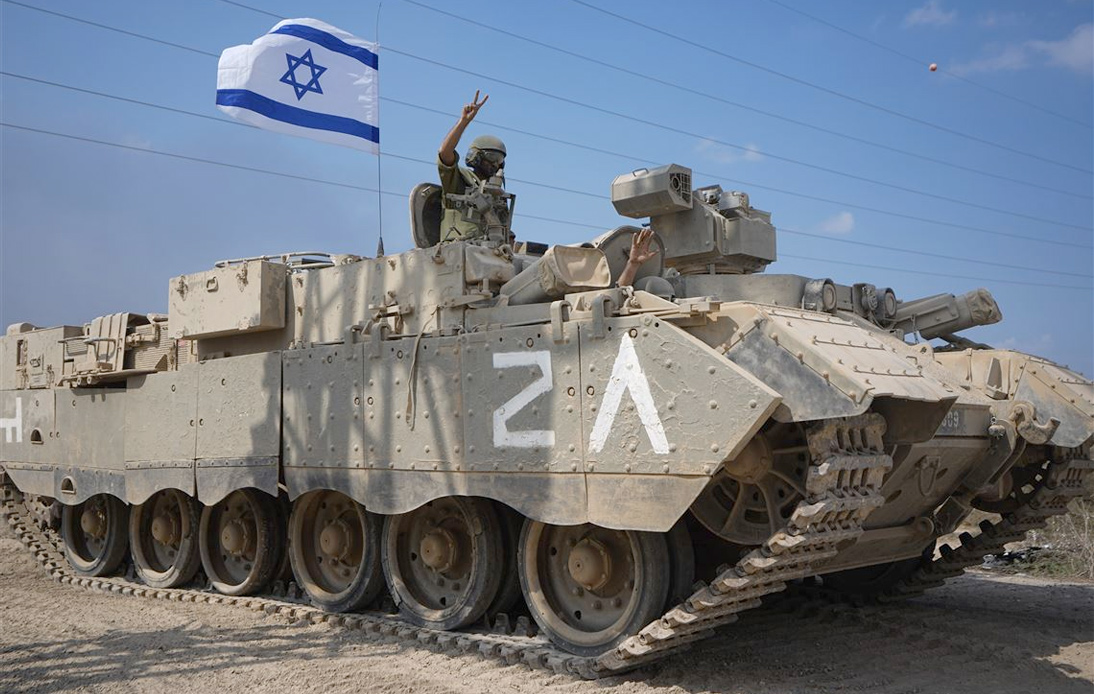
Prime Minister Benjamin Netanyahu met with Israeli soldiers near the Gaza Strip on Saturday, according to an official statement. A video from the visit showed him asking the soldiers, “Are you ready for the next stage? The next stage is coming.”
Though he didn’t provide further details in the video, the soldiers responded affirmatively.
The Israeli armed forces have stated they are prepared for a “coordinated” air, land, and sea operation in the Gaza Strip. This was Netanyahu’s first visit to the frontier since the unexpected incursion by Hamas attackers the previous week.
During his visit, Netanyahu visited the kibbutzim of Be’eri and Kfar Aza to inspect homes devastated during the previous weekend’s tragic assault, as reported by his office.
There has been some dissatisfaction in Israel regarding the prime minister’s delay in visiting the affected regions in southern Israel.
Given recent events, Israel seems to be leaning toward a ground assault on the Gaza Strip, especially following the shocking actions of Hamas that resulted in the deaths of many Israelis in border areas. “We are prepared,” Netanyahu stated during his visit to platform X.
A recent New York Times report revealed that due to weather issues, Israel’s military has decided to postpone its operation in the Hamas-controlled Gaza region.
While the ground operation had been scheduled for this weekend, it was deferred due to challenging weather conditions for air support, as mentioned by the New York Times, referencing three senior Israeli officers.
On Saturday, Israel carried out new air raids in northern Gaza, marking a week since its deadliest attack to date, and urged Palestinians to evacuate in anticipation of a ground operation.
As night fell, the explosions persisted, illuminating the surrounding darkness. The week-long Israeli strikes were in retaliation for an early morning assault by Islamist militants who breached the fortified borders, resulting in over 1,300 deaths.
In Gaza, medical authorities report over 2,300 fatalities and more than 9,700 injuries as of Sunday.
This recent casualty count represents those injured and killed by Israel since the conflict began on October 7. In Israel, the majority of the victims were civilians.
The Israeli blockade has severely reduced essential resources like food, water, fuel, and medical supplies, leading aid organizations to warn of an impending humanitarian crisis.
For the first time, the Israeli army revealed the discovery of bodies of hostages taken by Hamas. Israel’s security adviser warned Hezbollah against escalating tensions, threatening severe repercussions for Lebanon.
US President Joe Biden spoke with Netanyahu and Palestinian President Mahmoud Abbas on Saturday, advocating for humanitarian assistance in the region and reaffirming his commitment to protecting civilians.
A second US aircraft carrier, the USS Dwight D. Eisenhower, has been stationed in the eastern Mediterranean as a deterrent to threats against Israel.
On the diplomatic front, Saudi Arabia is advocating for an immediate ceasefire, and the US has asked China to mediate for peace.
Drawing parallels with the 9/11 attacks in the US, Israel has fired numerous missiles at northern Gaza. A significant Hamas figure, Ali Qadi, was killed in one of the airstrikes.
Approximately 1.1 million people, nearly half of the 2.4 million total population, live in northern Gaza. As the conflict escalates, aid organizations argue that relocating them is impractical.
Hamas leader, Ismail Haniyeh, accused Israel of committing war crimes in Gaza and denounced them for cutting off essential supplies. However, he dismissed the idea of Gazans relocating, including to Egypt.
While Israel is committed to countering Hamas, they assert that civilians are not their target.
Richard Hecht, an Israeli military spokesperson, highlighted the urgency for civilians in northern Gaza to evacuate, noting a temporary safety passage period but without detailing its length.
However, there are allegations that some civilians were killed during a bombardment while moving south, though this claim has not been immediately verified.
With exit routes blocked, Gazans are hastily packing and relocating amidst the destruction. This movement has congested the regional roads, forcing many to find shelter wherever possible, including streets and UN facilities.
Global aid organizations and several diplomats have expressed doubts about the viability of the evacuation strategy.




















